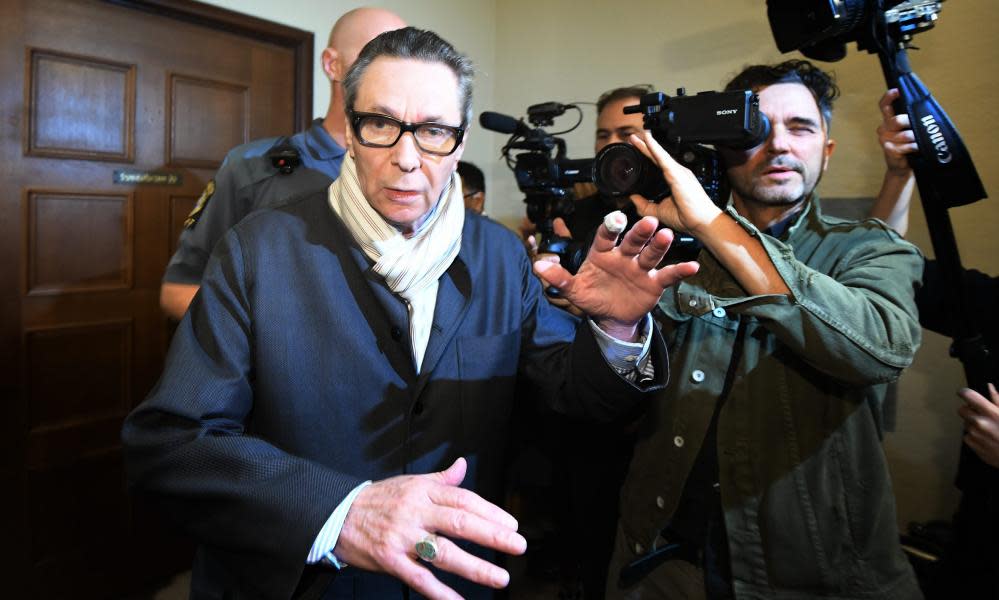Nobel panel's '19th member' appears in Swedish court on rape charges

The Frenchman at the centre of sexual abuse and financial misconduct allegations that forced the postponement of this year’s Nobel prize for literature has appeared in court in Stockholm facing two charges of rape.
Jean-Claude Arnault, who sometimes refers to himself as the Swedish Academy’s 19th member, pushed his way through a crowd of reporters outside the court building and refused to answer questions, saying only: “Leave me alone.” His lawyer, Björn Hurtig, said his client was “absolutely firm in his denial that the alleged offences took place”.
Hurtig, who has described the multiple allegations against Arnault as a “witch-hunt … whose only purpose may be to harm him”, told the Dagens Nyheter newspaper: “I believe that the evidence is flimsy. The information provided falls apart in fundamental ways.”
The proceedings, which will include testimony from the complainant and seven witnesses, are being held behind closed doors, as is common with Swedish cases involving alleged sexual crimes. Closing remarks are expected on 24 September; no date has been set for the verdict.
Arnault could face up to six years in prison if found guilty of forcing the woman to engage in oral sex and intercourse in a Stockholm apartment on 5 October 2011, and of raping her again during the night of 2 December in the same apartment while she was asleep.
Arnault has lived in Sweden for 50 years and been an influential figure on the country’s cultural scene for decades. He is married to Katarina Frostenson, a highly regarded poet and playwright and member of the Swedish Academy, which has awarded the world’s most prestigious literary prize since 1901.
In November, a month after accusations against the US film producer Harvey Weinstein triggered the #MeToo movement, Dagens Nyheter published detailed allegations by 18 women who accused Arnault of rape, sexual harassment, physical abuse and harassment over a period of more than 20 years.
The ensuing scandal – and disagreements over how to handle it – prompted nearly half the academy’s members to quit, leaving the body, which was founded by King Gustav III in 1786 and is still under royal patronage, little option but to postpone this year’s prize.
The alleged abuses are said to have taken place in Sweden and France, including at an apartment on the Rue du Cherche-Midi in Paris owned by the academy. Eight women filed formal complaints, and all but one of the cases were subsequently dropped for insufficient evidence or because they had exceeded the statute of limitations.
For years, Arnault, who describes himself as a photographer, and Frostenson ran Forum, a club in Stockholm that showcased exhibitions, readings and performances by prominent cultural personalities including Nobel laureates. The club was partly funded by the academy, prompting secondary allegations of a conflict of interest.
As the scandal unfolded, Dagens Nyheter also reported that an internal investigation by the academy had concluded that Arnault may have leaked the names of seven Nobel literature laureates – the subject of heavy betting – in advance of their announcement, including those of Bob Dylan in 2016 and Harold Pinter in 2005.
Barely known in his native France until the scandal erupted, Arnault was born in Marseille in 1946, the French daily Le Monde reported, and arrived in Sweden in 1968 or 1969.
The paper said he subsequently “constructed a legend” about himself, falsely claiming at various times over the past half-century to have been born into a wealthy family, attended the prestigious École Normale Supérieure and played a leading role in the May 1968 riots.
Arnault has also reportedly claimed to be related to the billionaire businessman Bernard Arnault, of the luxury goods firm LVMH, and to have worked as an opera director in France. In 2015 the Swedish culture minister awarded him the Order of the Polar Star, reserved for members of the royal family and foreigners who have worked “for the good of the kingdom”.
But even Arnault’s claim to be a photographer appears open to doubt: Le Monde said although he had briefly attended a photography school in Stockholm, he had never held an exhibition of his work, the only published examples of which appear to be in three of his wife’s poetry books.
Bitter internal disputes over its handling of the revelations led to the forced or voluntary departure of seven of the normally discreet academy’s 18 members, including Frostenson, who stepped down in April at the same time as the organisation’s former permanent secretary Sara Danius.
In May the organisation announced that in view of its “currently diminished” membership and the “reduced confidence” of the public in its deliberations, it would not be awarding a prize this year, with two laureates to be announced in 2019.

 Yahoo News
Yahoo News 
